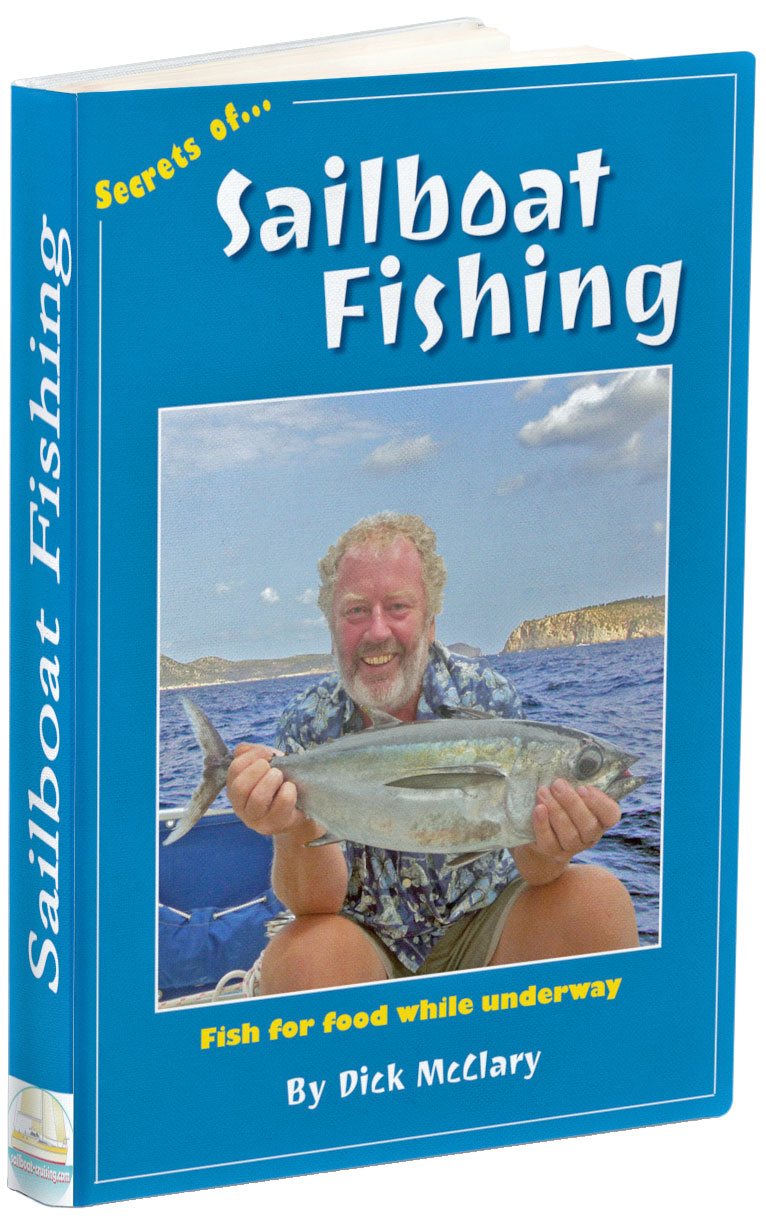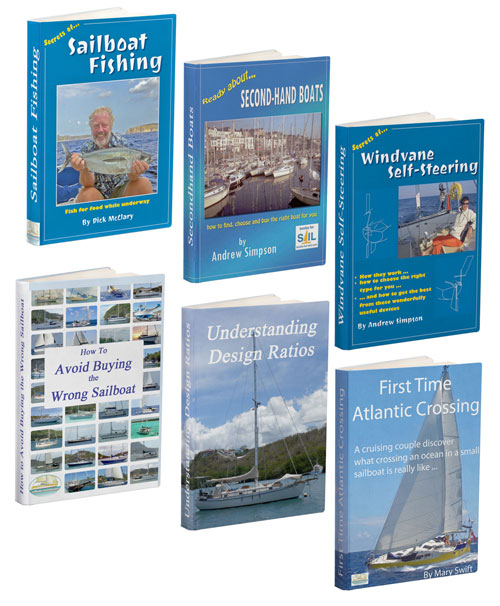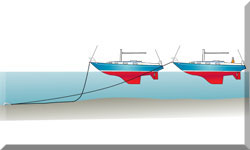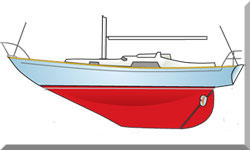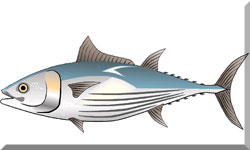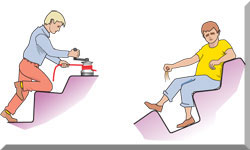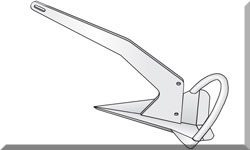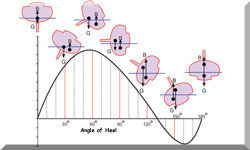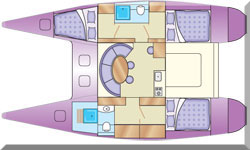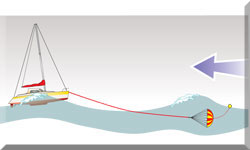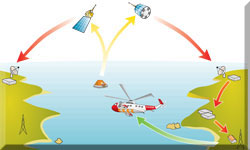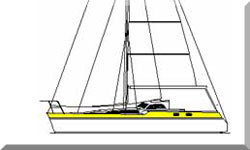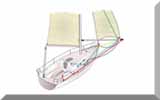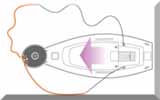- Home
- Bluewater Sailing
- Handline Fishing for Sailors
Offshore Fishing: Simple & Effective Handline Tips for Fresh Protein at Sea
In a Nutshell...
Underway, Handline Fishing is the best way for sailors to catch fresh, delicious fish without complicated gear. All you need is a trolling line made up of 100 feet of 300lb monofilament line, a simple snubber (shock absorber), and a durable lure like a cedar plug. Troll at your normal sailing speed (4–8 knots), positioning the lure in the clear water about 100 feet astern. When anchored, switch to a thinner, 100lb line with a two-hook paternoster rig to fish the seabed. In tropical zones, be extremely cautious of larger reef fish to avoid the very real danger of Ciguatera. Always wear heavy gloves when handling the line for safety.
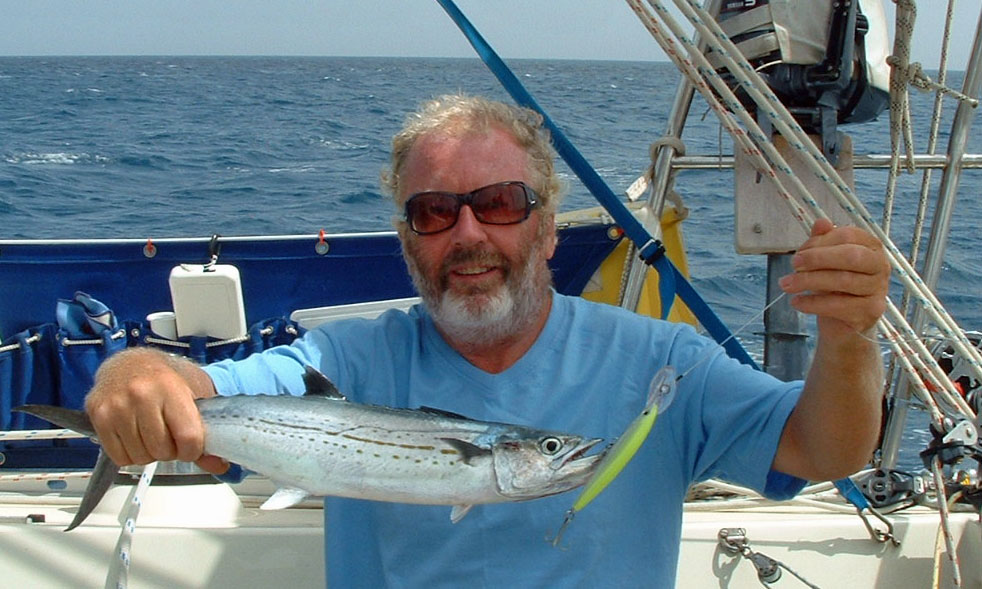 A small but tasty Spanish Mackerel caught on a Rapala lure
A small but tasty Spanish Mackerel caught on a Rapala lureTable of Contents
- Why Every Sailor Should Try Handline Fishing
- The Offshore Trolling Rig: Simple & Strong
- Deciding How Far Astern to Troll Your Lure
- Enhancing Your Catch Rate: Insider Tricks & Teasers
- Selecting & Rigging Offshore Trolling Lures
- Sailboat Fishing at Anchor or on a Mooring
- Identifying Your Catch & Navigating Ciguatera Risk
- Safety & Humane Handling
- From Deck to Dinner: Your Yacht Fish Prep Station & Storage
- Handline Storage & Maintenance Aboard
- Frequently Asked Questions
Why Every Sailor Should Try Handline Fishing
I was a keen fisherman long before I ventured offshore in a sailboat, so it didn't take me long to realise that when you're days from land, the simple pleasure of pulling in a fresh fish that'll become your dinner is hard to beat. Forget the complicated sport fishing gear, the fancy rods, and the expensive reels. Handline Fishing for Sailors is about pure, simple sustenance and self-sufficiency—a key skill for any long-distance voyage covered in more detail in The Ultimate Blue Water Sailing Guide: Preparation & Seamanship for the Ocean.
The gear is robust, inexpensive, and that single fresh meal caught far offshore will make the small investment worthwhile indeed. The beauty of a trolling handline is that you just let it do its thing until a hooked fish announces its predicament with a sudden, joyful pull.
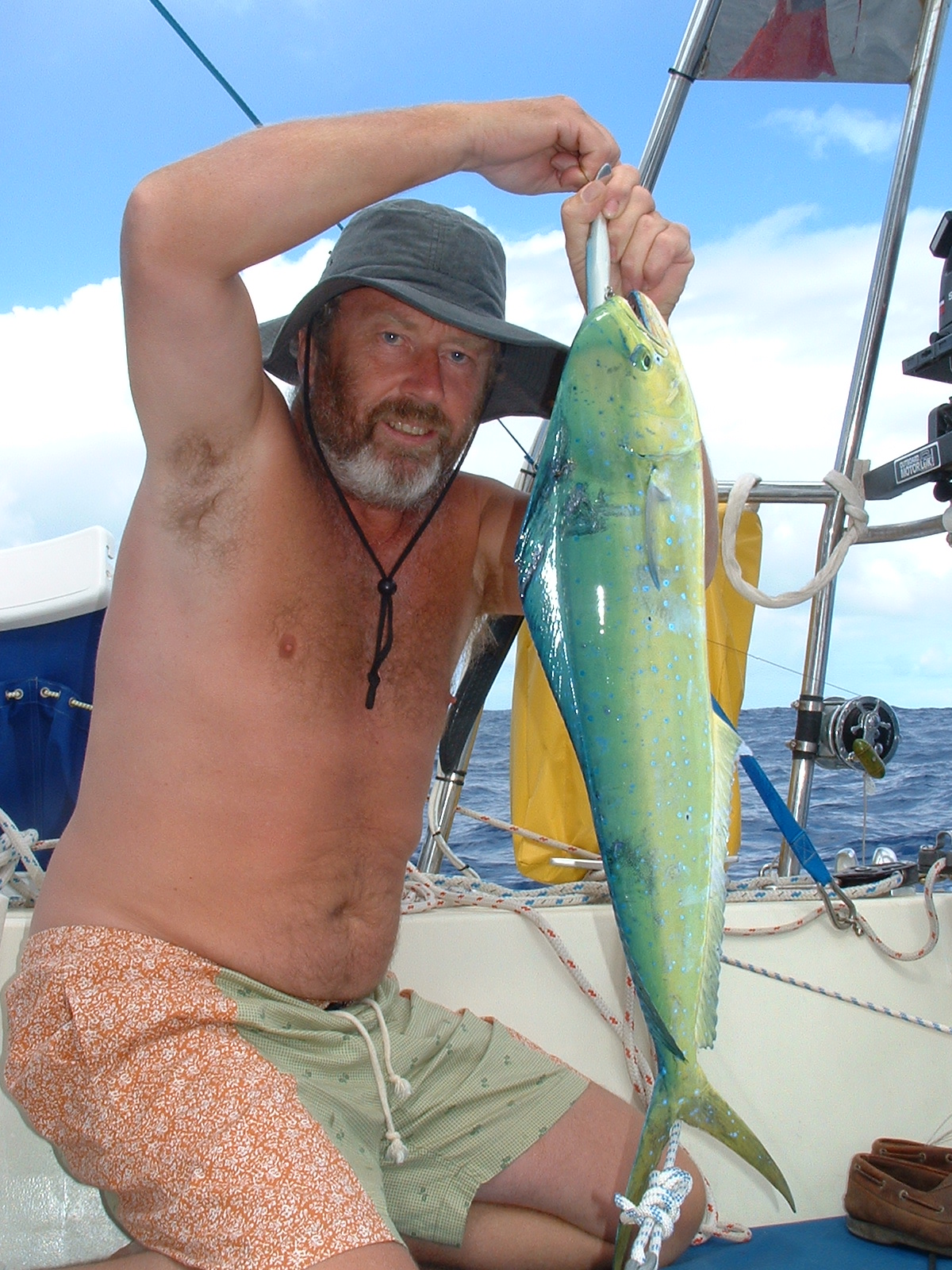 A Dorado, aka Mahe-Mahe or Dolphin Fish—one of the tastiest fish in the sea...
A Dorado, aka Mahe-Mahe or Dolphin Fish—one of the tastiest fish in the sea...The Offshore Trolling Rig: Simple & Strong
When you're sailing offshore at boat speeds of between 4 and 8 knots, you need a rig tough enough to handle fast, powerful pelagic fish. The gear has to be rugged but simple enough that it doesn’t require an engineer to set up.
Assembling the Basic Handline
Here's a breakdown of the essential gear for an offshore trolling handline:
- Main Line: 100 feet (30m) of 300lb breaking strain monofilament line. We use such a heavy line not just for strength, but because a thin line can cut into your hands when you're fighting a big fish. Monofilament is better than braid here because its stretch helps absorb the sudden shock of a strike.
- Leader: About 20 feet (7m) of 300lb leader material. This is your insurance policy; the leader is more abrasion-resistant, which is crucial when dealing with a thrashing fish near the boat.
- Connections: You won't be tying knots in this heavy line. All connections need to be made using crimps (or sleeves), and you'll need a proper cup-to-cup crimper tool to make a connection that won't fail under load. Use a ball-bearing snap swivel to connect the main line to the leader & lure; these are vital to prevent line twist.
The All-Important Snubber & Shock Absorber
This is the non-negotiable part of a trolling handline. The snubber, which is essentially a heavy-duty bungee cord, acts as a shock absorber. It stops a striking fish from instantly tearing the hook free or snapping the line. When you see it fully extended, you know it's time to get pulling!
Getting the Lure Action Right
Trolling for species like tuna, wahoo, and dorado (mahi-mahi) is about making your lure look like an easy meal.
- Speed: Your normal cruising speed of 4–8 knots is perfect. The key is that the lure must "swim" correctly at this speed.
- Depth: You want the lure swimming a few feet below the surface, but it should break the surface every few seconds before submerging again. Watch for the bubble trail streaming from the lure; this "noise" in the water is a huge attractant.
Deciding How Far Astern to Troll Your Lure
The exact distance—or line setback—is arguably more important than the lure you choose. We want the lure in the clean, undisturbed water behind your yacht.
The boat's hull and prop create a turbulent, noisy wake. Fish aren't usually found in that chaos.
- Avoid the Wash: The first 30 to 50 feet (10–15m) behind the transom is a messy mix of bubbles. A lure here is usually ignored.
- Find the Second Wave: The ideal distance is often where the wake begins to subside and forms a more defined, secondary wave pattern. For most cruising yachts, this "clean water" zone is typically between 75 and 150 feet (23m to 45m) behind the boat.
- Use the Noise: A smart exception: placing your closest lure into the very tail end of the prop wash can sometimes work, as the noise and bubbles, combined with a splashing teaser, can mimic a frantic baitfish shoal.
I recommend starting at about 100 feet (30m) for your main line. Look back and adjust the length until the lure looks like it's swimming naturally and aggressively in the clearest water available.
Enhancing Your Catch Rate: Insider Tricks & Teasers
Use a Teaser or a Daisy Chain
As an experienced sailor, I know that deception is often the most effective way to provoke a strike. Fish get excited when they sense a shoal of baitfish splashing about.
- Teaser: Replicate this with a splashy teaser towed a few feet in front of your lure. A net bag full of wine bottle corks is a cheap, effective option.
- Daisy Chain: Even more alluring is a daisy chain—a string of unhooked lures (decoys) ahead of the one with the hook. You can make a low-cost version by positioning a few plastic squid skirts along the leader.
Double Your Chances
Why not put out two lines? I often run one line around 100 feet long (30m) and a second one a little longer, say 120 feet (35m).
- Use a different type of lure on each line.
- Keep the longer line on the leeward side; this helps space them apart and prevents tangles when you turn.
- Crucial Rule: As soon as you get a strike on one, bring the other one in immediately. Two fish on at once is a recipe for a catastrophic tangle and no fish at all.
Selecting & Rigging Offshore Trolling Lures
We’re not after a world record billfish; we just want a healthy, delicious meal. So, let's keep the lure selection simple, durable, and effective at our cruising speeds.
Lure Selection Guidelines
| Feature | Cruising Sailor's Choice | Why It Matters |
|---|---|---|
| Speed Range | 2 to 8 knots (Must work at slow speed) | Lures designed for high-speed game fishing will not "swim" enticingly at sailboat speeds. |
| Lure Size | 4" to 8" (100mm to 200mm) overall length | A smaller lure discourages hooking huge fish that are difficult to manage & land on a yacht. |
| Durability | Indestructible options (Cedar Plugs, Metal Spoons) | Toothy fish like wahoo & barracuda will destroy fragile soft-plastic lures in one bite. |
| Hook Safety | Single-hook lures preferred | Multiple treble hooks are a major hazard when unhooking a lively fish in a small, pitching cockpit. |
The Wire Leader Question
Sooner or later, you'll hook a wahoo or a barracuda—fish with razor-sharp teeth that can slice through even heavy monofilament like butter. This is why you need a short, 2 to 3-foot wire leader rigged ahead of the lure. Use single-strand wire and rig it with a haywire twist for the most reliable connection.
Sailboat Fishing at Anchor or on a Mooring
If offshore trolling didn't produce the goods, and you've arrived fishless and famished at your destination—all is not lost!
The At-Anchor Rig
You can still use a handline here, but the setup is a little different.
- Main Line: 100lb breaking strain nylon monofilament is about right. The thickness is for ease of handling.
- Line Holder: Wind your line around a Cuban YoYo (a circular plastic reel) or a simple, cut-out plywood line holder.
- The Rig: A two-hook paternoster rig is a reliable choice for bottom fishing. This is made up of a thinner, less visible leader material—say, 20lb monofilament—and is about 5 feet (1.5m) long. A heavy sinker (a nut or bolt works fine) keeps the rig vertical on the seabed.
Bait & Timing
Nothing beats small slivers of fresh oily fish or squid, but an excellent standby is pork luncheon meat. The hours of darkness are often the most productive for fishing in an anchorage.
Identifying Your Catch & Navigating Ciguatera Risk
Catching a magnificent specimen on passage is a huge reward, but you need to know what you've got and, crucially, whether it's safe to eat. This is where experience counts, particularly in tropical & sub-tropical areas where Ciguatera fish poisoning is a serious, even life-threatening, concern.
Ciguatera is caused by a toxin that builds up in the food chain, typically in larger, predatory, reef-dwelling fish.
The rules I stick by are simple:
- Know the Local Advice: When you arrive in a new cruising ground, ask the local fishermen or tackle shops what species are currently considered "hot" or toxic.
- Avoid Large Reef Predators: Be extremely cautious of large, older fish that are known to live on reefs. This includes Barracuda and especially large Groupers & Snappers. As they grow older and larger, they accumulate more toxins. I generally avoid eating any reef fish over about 5kg (11lb), regardless of the species, to be safe.
- Recognise Safe Pelagics: Species caught in the open ocean like Dorado (Mahi-Mahi), most Tuna species, and Wahoo are nearly always safe to eat.
Always err on the side of caution. No fresh fish is worth a potential trip to a tropical hospital.
Safety & Humane Handling
Ocean fish are fast & powerful. When you land one, they’re at their most dangerous. You’ve got a twitching, flapping bundle of muscle with sharp hooks and potentially sharp teeth in your cockpit—always prioritise safety.
- Line Management: Always wear tough gloves when hauling in the line. Never, ever take a loop of line around your hand. Keep your cockpit clear of accumulating line loops; a large fish could grab the line and pull it taut, creating a nasty trip hazard.
- Knife: Always have a sharp knife to hand, ready to cut the line instantly if you or your vessel get into a serious bind.
- Humane Dispatch: To accelerate its passing & ensure the best quality of meat, you must dispatch it humanely and quickly. Use a sharp blow to the head with a priest (a heavy wooden club) or similar tool just above the eyes (percussive stunning). Bleed the fish out immediately by cutting the gills or main artery. Wait until the fish is completely still before attempting to unhook it.
From Deck to Dinner: Your Yacht Fish Prep Station & Storage
The moment the fish is subdued and bled, the clock starts ticking, especially in warm climates. Successful cruising anglers know that handling the fish quickly and cleanly is crucial for meat quality and boat hygiene.
The Cockpit Prep Station
- The Best Spot: The ideal place to gut, clean, and fillet is over the stern of the boat. You can use a large chopping board secured to the pushpit or the transom steps.
- Keep it Wet: Rinse down the area immediately with saltwater, not precious fresh water, to prevent blood from drying and setting into the deck or teak.
- The Tools: You need a sharp fillet knife, a sturdy fish scaler, and a boning knife for precision work.
Storage & Preservation
- Quick Chill: Once the fish is filleted, rinse the fillets one final time in clean, cold saltwater. Do not rinse them with fresh water, as this can start to break down the muscle fibres and make the meat soft.
- Vacuum Seal: If you have a vacuum sealer aboard, use it! It's the best way to prevent freezer burn and keep the fish in top condition for up to six months.
- The Freezer Block: If vacuum sealing isn't an option, place the fillets in a zip-lock bag, add a small amount of saltwater, and freeze them lying flat. The layer of ice acts as a protective glaze against freezer burn. Mark the bag with the fish type and the date.
Handline Storage & Maintenance Aboard
Handlines are simple, but they can quickly become a tangled, corroded mess in the humid, salt-filled environment of a cruising yacht if not stored correctly.
1. Line Management is Everything:
- The Right Spool: The heavy main line should be wrapped around a dedicated, sturdy line holder—like the Cuban Yo-Yo or a custom wooden spool. Never just pile it into a bucket; it will inevitably tangle into a bird's nest.
- The Figure-Eight: When coiling any line, use the figure-eight method rather than simple loops. This dramatically reduces the chance of twists and snarls when you next pay it out.
2. Post-Fishing Maintenance:
- Fresh Water Rinse (For Gear Only): After every trip, or immediately upon landing a fish, completely soak the leader, swivels, and lures in a bucket of fresh water for at least 15 minutes. Salt corrosion will destroy swivels and hooks rapidly.
- Lure Storage: Remove the lure from the leader/snubber rig and store them separately. Keep expensive lures in a dry, ventilated box.
- Hook Maintenance: Regularly inspect all hooks. If a hook point feels dull when you drag it across your thumbnail, sharpen it immediately with a small file or hook sharpener. A dull hook is the primary reason fish escape.
This article was written by Dick McClary, RYA Yachtmaster and author of the RYA publications 'Offshore Sailing' and 'Fishing Afloat', member of The Yachting Journalists Association (YJA), and erstwhile member of the Ocean Cruising Club (OCC).
Frequently Asked Questions
Q1: What size fish should I be aiming for when trolling from a sailboat?
Q1: What size fish should I be aiming for when trolling from a sailboat?
You should aim for fish in the 10 to 30lb range (5 to 14kg). This size provides a fantastic, manageable meal. Use lures in the 4" to 8" (100mm to 200mm) range to discourage the massive, unmanageable gamefish like marlin.
Q2: Why is a snubber essential for offshore handline trolling?
Q2: Why is a snubber essential for offshore handline trolling?
A snubber, typically a bungee cord, is vital because it acts as a shock absorber. A powerful, fast-swimming fish will hit the lure at speed, and without the snubber's stretch, the sudden, massive shock load would likely tear the hook free from the fish's mouth or snap the line entirely.
Q3: What is the ideal distance to troll a lure behind a cruising sailboat?
Q3: What is the ideal distance to troll a lure behind a cruising sailboat?
The ideal distance is the "clean water" zone, typically between 75 and 150 feet (23m to 45m) astern. This allows the lure to swim naturally outside the boat's immediate, turbulent wake, where a fish is more comfortable striking. A good starting point is about 100 feet.
Q4: Which fish should a sailor avoid eating in tropical anchorages?
Q4: Which fish should a sailor avoid eating in tropical anchorages?
You should be highly cautious of large, predatory fish caught on or near reefs, particularly Barracuda and very large Groupers & Snappers. These species are most likely to carry the potentially deadly Ciguatera toxin. Avoid eating any reef fish over about 5kg (11lb).
Q5: What is the most durable lure for a cruising sailor?
Q5: What is the most durable lure for a cruising sailor?
The cedar plug is arguably the most durable and effective lure for offshore cruising. It is a proven fish-catcher globally, is made of tough wood or robust substitutes, and can withstand repeated attacks from toothy species without falling apart or getting damaged like softer plastic alternatives.
Q6: How should I clean and store fish if I don't have a vacuum sealer?
Q6: How should I clean and store fish if I don't have a vacuum sealer?
Rinse the fillets in clean, cold saltwater (never fresh water), place them in a zip-lock bag, add a small amount of saltwater to create an ice glaze, and freeze them lying flat. Be sure to mark the bag with the fish type and date to track freshness.
Resources Used
Recent Articles
-
Passoa 47 Sailboat Review: Comprehensive Specs & Performance Analysis
Jan 04, 26 04:57 AM
Discover the Passoa 47, a legendary aluminium blue water cruiser by Garcia. Explore technical specifications, design ratios, and why its lifting keel is a game-changer for offshore sailors. -
Sailboat Wheel Steering Maintenance & Inspection Checklist
Dec 30, 25 02:32 PM
Keep your vessel’s helm responsive and reliable with our expert maintenance checklist. Master cable tensioning and system inspections to avoid mid-passage failures. -
Modern Boat Electronics and the Latest Marine Instruments
Dec 20, 25 05:27 PM
Should sailboat instruments be linked to the latest boat electronics as a fully integrated system, or is it best to leave them as independent units?
